Overview
Mental health professionals often face overwhelming emotional challenges in their work. The administrative burdens can weigh heavily, detracting from the time they wish to dedicate to patient care. How often do you find yourself caught up in paperwork instead of focusing on those you aim to help?
AI mental health notes tools present a promising solution. These innovative tools significantly reduce the time spent on documentation, allowing clinicians to shift their focus back to what truly matters—their patients. Imagine the relief of having more time to engage with those in need, enhancing the therapeutic relationship.
Moreover, these AI solutions not only streamline documentation but also enhance accuracy and efficiency. This improvement can lead to better therapeutic outcomes, fostering a more supportive environment for both practitioners and patients.
We encourage you to explore how these tools can transform your practice. By embracing AI, you can alleviate some of the burdens you face daily, ultimately improving the care you provide. Together, let’s prioritize what truly matters in mental health care.
Introduction
In the rapidly evolving landscape of mental health care, many practitioners face emotional challenges as they navigate the complexities of their roles. The integration of artificial intelligence (AI) offers a compassionate solution, transforming how they manage documentation and patient interactions. With innovative tools designed to streamline administrative tasks—like note-taking and appointment scheduling—providers can devote more time to delivering the compassionate care their patients deserve, rather than becoming overwhelmed by paperwork.
Platforms such as CosmaNeura and Therapulse.ai enhance efficiency while ensuring compliance with industry standards. This not only alleviates stress for mental health professionals but also ultimately improves patient outcomes. As these advancements are embraced, the potential for AI to redefine therapeutic relationships and enhance overall care becomes increasingly evident. Isn't it inspiring to think about how technology can support our commitment to care? Let's explore how we can harness these tools to foster deeper connections with our patients.
CosmaNeura: Streamline Mental Health Documentation with AI-Powered Solutions
At CosmaNeura, we understand the emotional challenges that mental health providers face in their daily practice. The administrative burdens can often feel overwhelming, detracting from the time and energy that should be dedicated to patient care. Our robust platform for AI mental health notes is designed to ease these challenges by automating documentation tasks, allowing clinicians to focus more on providing compassionate support while ensuring adherence to Catholic teachings.
Imagine a world where real-time transcription captures telehealth sessions accurately, and diagnostic guidance aids in clinical decision-making. By optimizing billing processes, CosmaNeura enhances revenue potential for practices, alleviating the burden of time-consuming administrative tasks. This automation helps healthcare providers regain valuable time, ultimately improving patient service. Recent statistics reveal that 75.7% of radiologists trust AI-driven algorithms, reflecting a growing confidence in AI technologies that is also emerging in mental wellness.
In the realm of mental wellness services, nearly two-thirds of practitioners in regions like South America and Asia Pacific anticipate that AI mental health notes will significantly influence their decision-making in the coming decade, particularly in record-keeping and patient engagement. Case studies show that a majority of pathologists believe AI will enhance diagnostic accuracy and efficiency, indicating that AI mental health notes could also benefit from similar improvements. By streamlining administrative tasks, CosmaNeura not only boosts provider efficiency but also fosters greater job satisfaction, enabling healthcare professionals to concentrate on delivering compassionate care.
This commitment to ethical standards and operational efficiency positions CosmaNeura as an invaluable asset in the evolving landscape of . As Mike Sutten, CTO at Innovaccer, wisely stated, "These advances in medical technology aren't replacing personal interactions – they're creating more opportunities for meaningful ones." This sentiment resonates deeply with CosmaNeura's mission to enhance the quality of care through AI, inviting you to explore how we can support your practice in navigating these challenges.
Therapulse.ai: Optimize Your Therapy Notes with Advanced AI Technology
Therapists often face overwhelming administrative burdens that can detract from the valuable time spent with clients. Therapulse.ai understands these challenges and utilizes advanced AI technology to simplify the generation of , allowing therapists to create accurate records in under a minute. Imagine reclaiming those precious minutes—studies indicate that therapists can save between 5 to 15 minutes per session, totaling up to 300 hours annually per clinician.
This innovative tool offers key features such as:
- Automated data entry
- Customizable templates
- Real-time compliance checks
All designed to enhance administrative efficiency. By automating records, Therapulse.ai not only supports adherence to industry standards but also allows therapists to focus more on meaningful client interactions, ultimately enhancing therapeutic outcomes.
As the integration of AI in therapy documentation becomes standard practice, it fosters greater efficiency and ensures that therapists can engage more deeply with their clients. Recent advancements in AI technology further bolster this trend, with tools like Therapulse.ai at the forefront of creating AI mental health notes and enhancing overall well-being.
Moreover, the incorporation of AI is addressing healthcare challenges by improving patient engagement and interoperability within healthcare systems. By alleviating the administrative burden, AI solutions like Therapulse.ai empower providers to deliver more patient-centric care. To maintain precision and compliance, it is essential to perform monthly evaluations of AI-generated notes, reinforcing a commitment to high-quality records and ensuring that administrative efficiency is upheld. How might this support your practice and enhance your connection with clients?
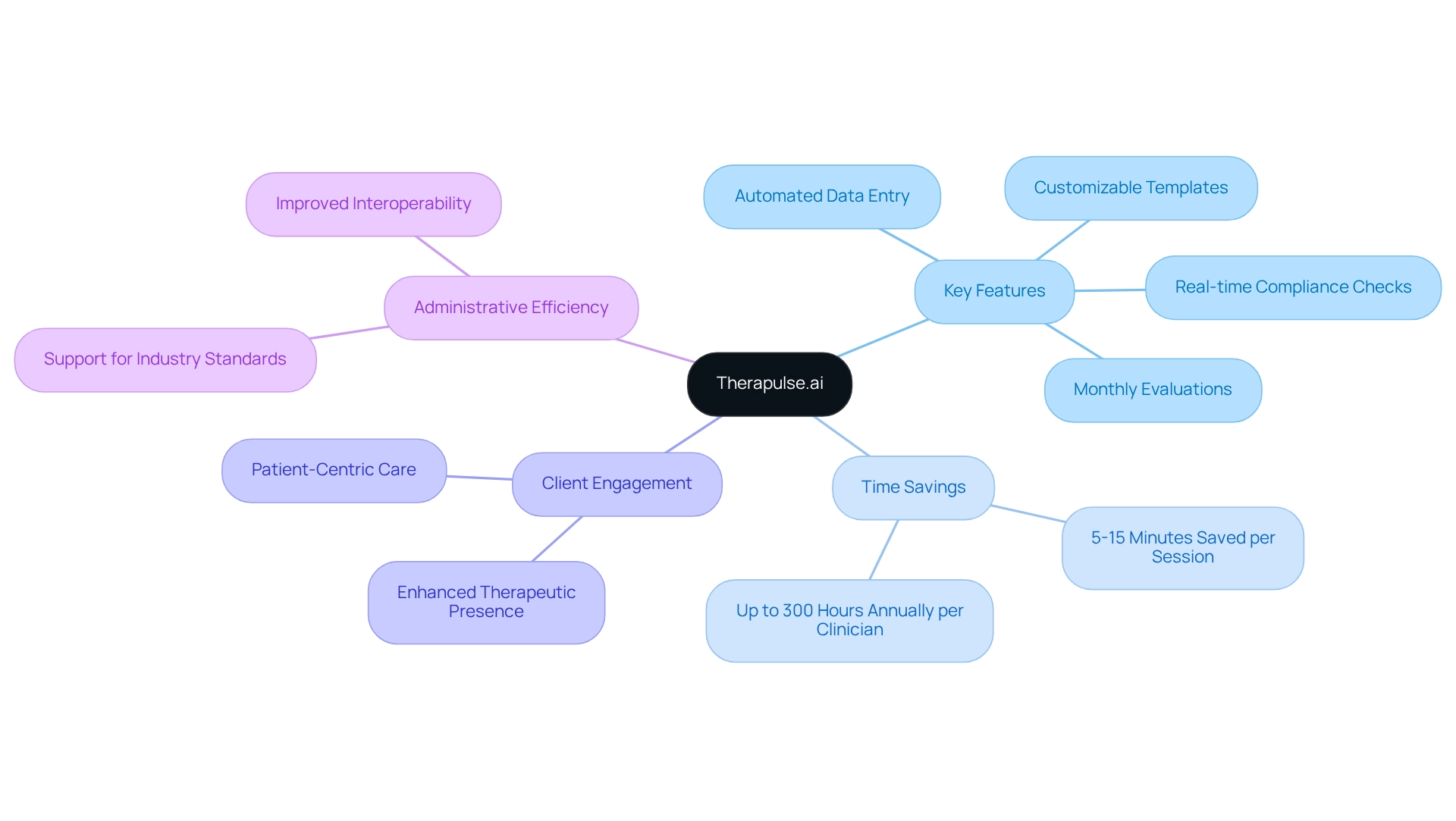
SoapNoteAI: Transform Your Therapy Notes from Time-Consuming to Time-Saving
In today's fast-paced healthcare environment, many therapists face overwhelming administrative burdens that can detract from their primary focus: patient care. SoapNoteAI offers a compassionate solution by transforming through automation. This innovative approach allows therapists to swiftly create notes that adhere to HIPAA regulations and other compliance standards, significantly reducing the time spent on paperwork. Imagine reclaiming precious hours each week to dedicate to your clients, enhancing the quality of care you provide.
Statistics indicate that by 2025, automated SOAP note solutions could cut record-keeping time by up to 50%. This reduction is not just a number; it represents a real opportunity for mental health practices to enhance overall productivity and improve patient interactions. As we navigate a landscape where 98% of organizations have encountered cybersecurity breaches, the importance of compliance and security cannot be overstated. How can we ensure that our practices remain safe and efficient?
Experts emphasize that tools like SoapNoteAI not only streamline documentation but also bolster compliance with regulatory standards. This is particularly crucial for healthcare startups, which often grapple with navigating complex regulations and unique buying processes. As Rick Stevenson wisely notes, "Effective automation can reduce cybersecurity risks linked to managing sensitive client information." This highlights the vital role of compliance in the realm of automation.
Therapists using automation tools have reported remarkable time savings, allowing them to redirect their efforts toward meaningful client interactions and therapeutic activities. Case studies reveal that employing automated record-keeping leads to significant enhancements in workflow efficiency, ultimately resulting in better outcomes for individuals.
Moreover, with the Federal Trade Commission actively enforcing the Health Breach Notification Rule, the urgency for compliant record-keeping practices is greater than ever. By integrating AI mental health notes into their documentation procedures, mental wellness specialists not only enhance operational efficiency but also ensure compliance with evolving healthcare regulations. This proactive approach helps overcome resistance to innovation, fostering a culture of quality service and care. Together, let's embrace these advancements and prioritize what truly matters: the well-being of our clients.
Upheal.io: Enhance Your Intake Process with AI-Driven Solutions
Upheal.io is dedicated to supporting mental wellness professionals by automating the intake process, utilizing AI-driven solutions to quickly and accurately gather essential client information. This innovation alleviates administrative burdens, such as automated appointment scheduling and medical record management, enabling therapists to cultivate meaningful connections with their clients from the very first interaction. By reducing the strain of time-consuming paperwork, AI allows healthcare providers to dedicate more time to individuals, enhancing the quality of interactions and helping to reduce burnout.
Have you ever felt overwhelmed by paperwork? Statistics reveal that AI can significantly boost efficiency in mental wellness intake processes, with some studies indicating improvements of up to 30% in time management for practitioners. Additionally, AI algorithms can predict suicide attempts within the upcoming week with 92% accuracy, underscoring AI's potential to enhance individual safety and care. However, the integration of AI in mental wellness does come with challenges. A survey found that 68% of U.S. adults worry that AI might weaken patient-provider relationships, while 63% express concerns about data security. Despite these worries, mental wellness experts report that AI mental health notes generated by AI-powered intake solutions reduce documentation burdens, allowing more time for client support.
As we look towards 2025, trends indicate an increasing reliance on AI technologies, with many clinics adopting these tools to improve client information capture during therapy sessions. Case studies show that methods utilizing AI mental health notes for intake have led to greater satisfaction among individuals and improved therapeutic outcomes. Experts emphasize the transformative power of AI mental health notes in mental wellness, highlighting their role in streamlining workflows and ensuring comprehensive individual support. Furthermore, suggest that mental wellness chatbots provide personalized assistance and refer situations to human therapists when necessary, ensuring that individuals receive the support they need. As AI continues to evolve, its integration into mental wellness practices is set to revolutionize how providers connect with individuals, ultimately enhancing the quality of service delivered.
Consider how AI could ease your workload and improve your interactions with clients. Embracing these advancements may not only benefit your practice but also significantly enhance the care you provide.
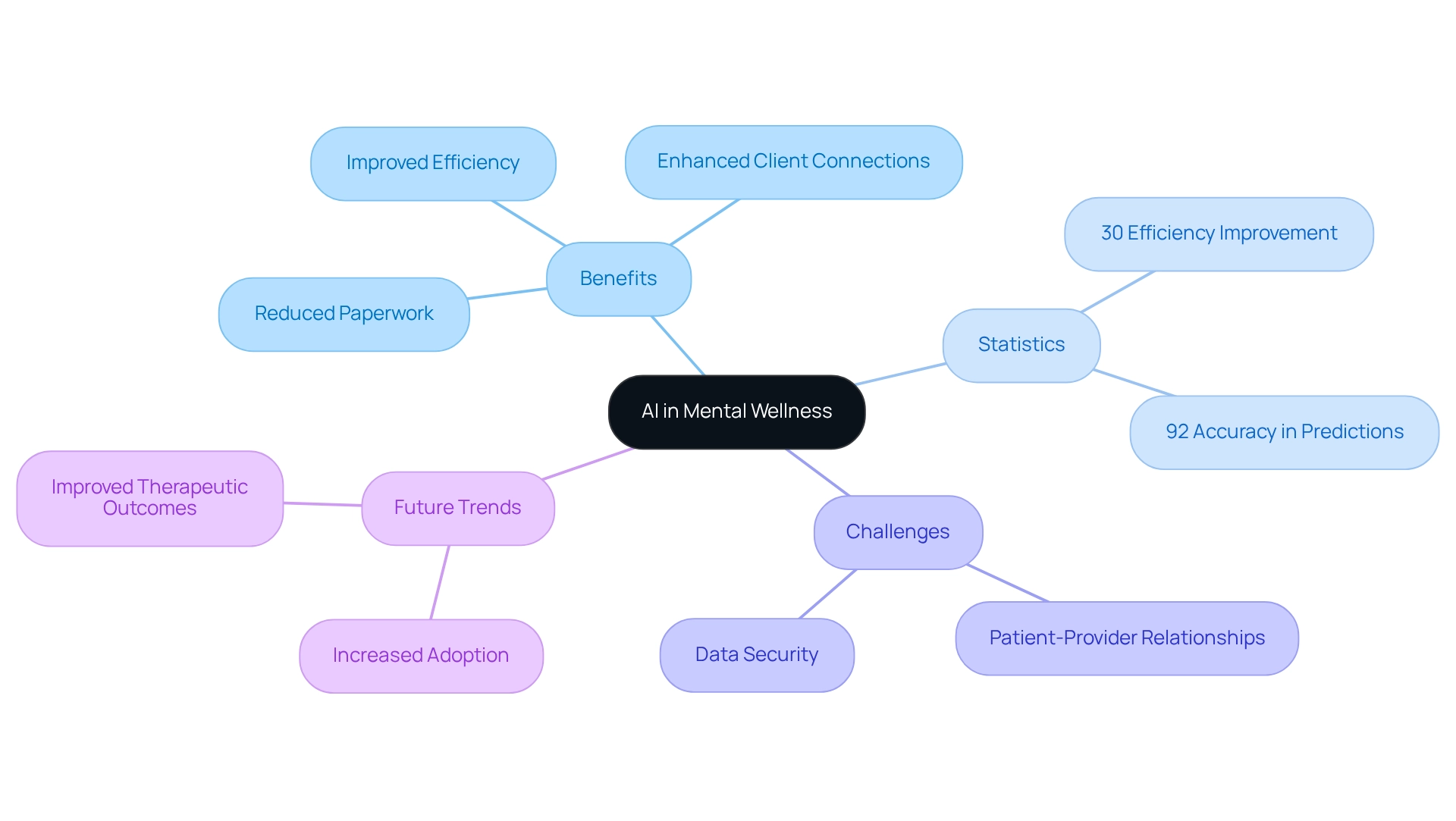
ScienceDirect: Explore AI's Impact on Mental Health Documentation and Care
ScienceDirect features an extensive collection of research papers that delve into the impact of AI mental health notes and their support for well-being. These studies consistently demonstrate that AI technologies significantly enhance documentation accuracy, alleviate administrative burdens, and improve outcomes for individuals. For instance, recent findings indicate can help reduce the administrative load in mental wellness environments, allowing providers to dedicate more time to patient support. Yet, it’s crucial to recognize that 57% of respondents expressed concerns that their relationship with healthcare providers might deteriorate due to AI. This highlights the importance of thoughtfully integrating these technologies to address provider concerns and ease resistance to innovation.
Moreover, a systematic review of AI chatbots showcased their ability to engage over 990,000 users, underscoring their efficiency in delivering scalable, low-cost mental wellness interventions, such as AI mental health notes. This scalability is vital in addressing the access crisis in mental wellness services, particularly for marginalized populations. These interventions resonate with the compassionate spirit of Catholic healthcare, providing essential support to those in need.
Expert opinions emphasize that AI mental health notes not only streamline documentation processes but also enhance diagnostic capabilities, ultimately contributing to improved patient outcomes. As Matellio, an AI partner for mental wellness clinics, articulates, "AI reduces admin workload, cuts wait times, improves diagnostics, and increases revenue—making it a smart, long-term investment." As healthcare providers consider integrating AI, these insights form a solid foundation for understanding the potential benefits of adopting AI solutions in their practices.
To begin the journey of integrating AI, providers should contemplate initiating pilot programs that focus on specific administrative tasks. This approach allows for gradual adaptation and assessment of AI's impact on their workflows, fostering a supportive environment for change.
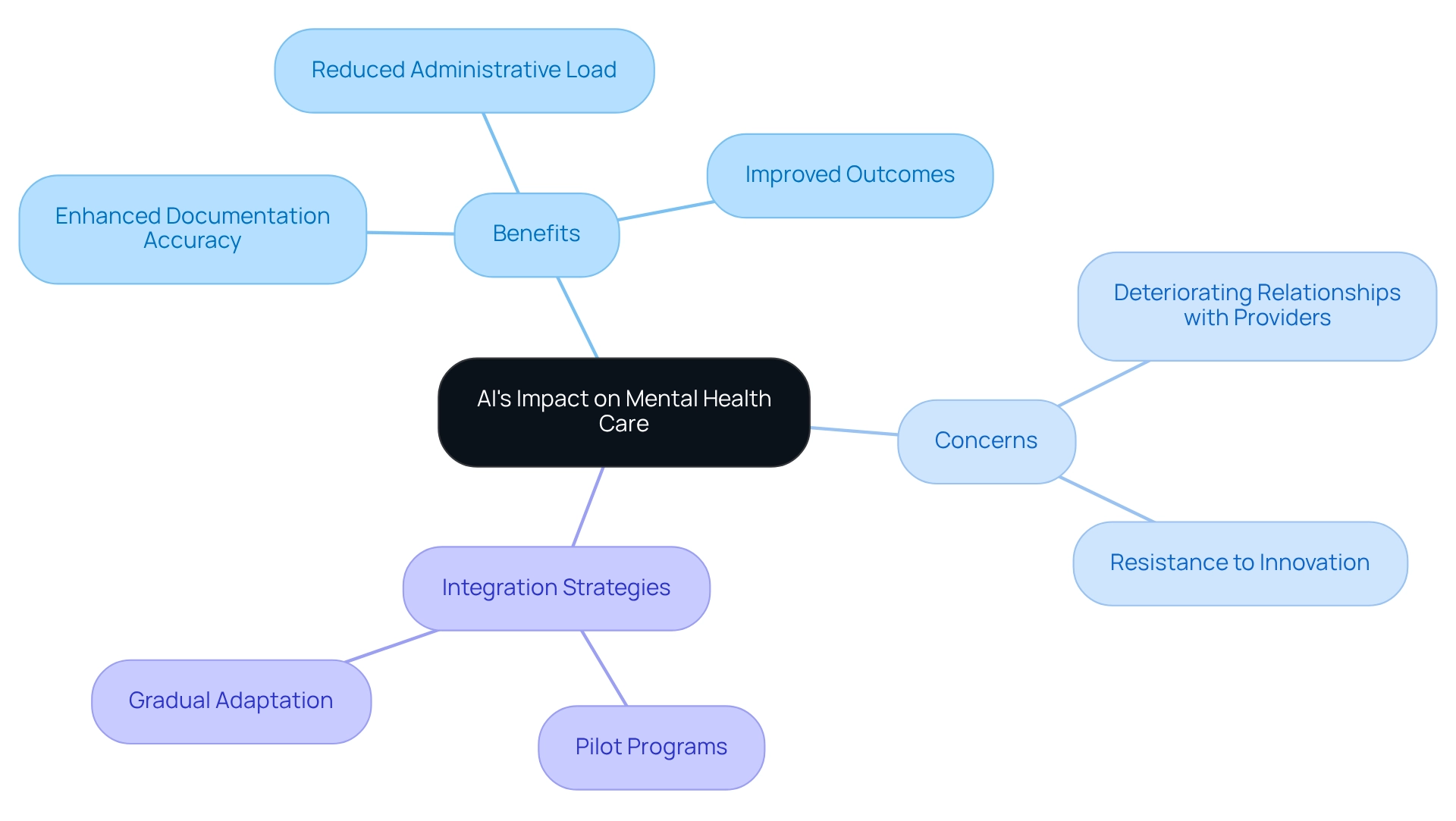
GetNudgeAI: Create Personalized Mental Health Notes in Seconds
GetNudgeAI empowers mental health professionals by enabling them to generate in mere seconds. This innovative tool harnesses the power of AI to customize records, reflecting the unique needs and circumstances of each individual. By promoting a more personalized approach to care, it addresses the emotional challenges faced by healthcare providers.
Statistics show that 39% of healthcare providers believe AI will boost patient satisfaction. This suggests that tools like GetNudgeAI can significantly enhance therapeutic relationships by ensuring that records are timely and relevant to patient needs. Furthermore, case studies reveal that while pathologists exhibit the highest confidence in AI's role in healthcare, mental health specialists—particularly psychiatrists—display a more cautious optimism. This highlights the importance of tools that streamline documentation and enhance the quality of care provided.
By easing the burden of time-consuming administrative duties, GetNudgeAI allows healthcare providers to focus more on their interactions with individuals. This is especially important for those who may be risk-averse regarding innovation. Notably, 1% of respondents had no answer about their feelings toward AI in healthcare, indicating a generally positive sentiment among the majority. GetNudgeAI's automation of AI mental health notes not only saves time but also ensures that each individual's experience is accurately captured. Ultimately, this leads to improved outcomes and satisfaction, encouraging mental health professionals to embrace this supportive tool in their practice.
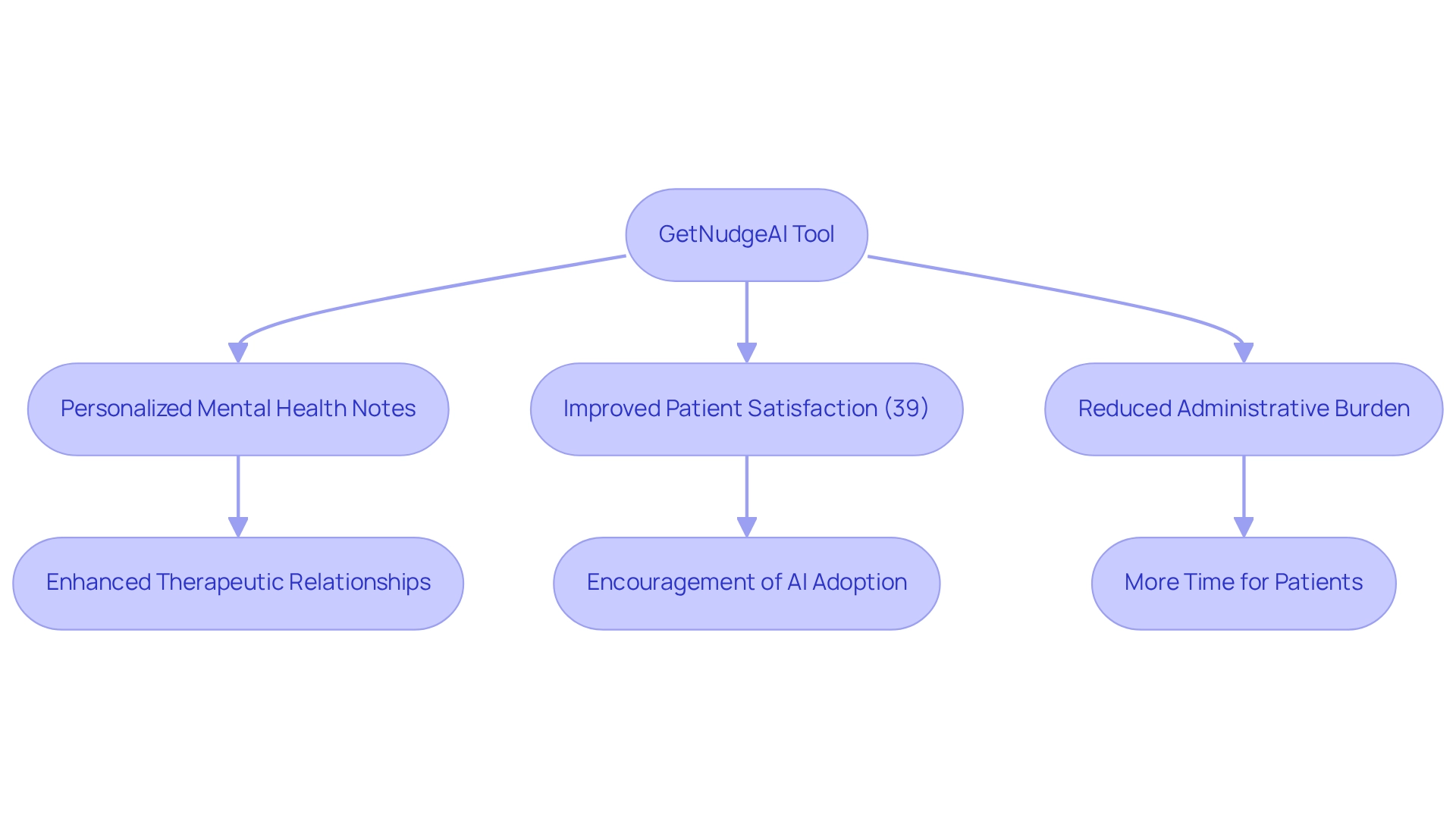
OTPotential.com: Access AI Tools for Enhanced Occupational Therapy Documentation
OTPotential.com presents a suite of AI tools designed with care to enhance record-keeping for occupational therapy, which includes capabilities for AI mental health notes that help therapists streamline their note-taking processes. These resources not only ensure compliance with regulatory standards but also significantly improve the quality of care provided to individuals. By automating routine record-keeping tasks, CosmaNeura's AI solutions enhance the accuracy and detail of AI mental health notes, enabling therapists to concentrate more on providing personalized support instead of being overwhelmed by administrative tasks. With to be crafted by medical experts, it's essential for occupational therapy resources to uphold high credibility and relevance to clinical practice.
Recent insights indicate that while 42% of physicians feel AI complicates healthcare, a notable 83% believe it can effectively tackle healthcare challenges when aimed at enhancing efficiency. This sentiment resonates with occupational therapists, who express that the use of AI mental health notes can significantly reduce the time spent on record-keeping, allowing them to dedicate more attention to client support. Moreover, as highlighted by the Keragon Team, only 25% of healthcare executives had embraced generative AI solutions by December 2023, revealing a substantial opportunity for occupational therapy practices to leverage these tools and refine their record-keeping processes. Furthermore, OTPotential.com offers resources that empower therapists to utilize AI mental health notes effectively, ensuring they remain at the forefront of occupational therapy practices. By adopting these advanced tools, therapists can enhance their record-keeping methods with AI mental health notes, ultimately leading to greater job satisfaction and improved quality of care for clients. This shift in healthcare delivery not only alleviates physician burnout but also enriches experiences for individuals, paving the way for a more efficient and patient-centered healthcare system.
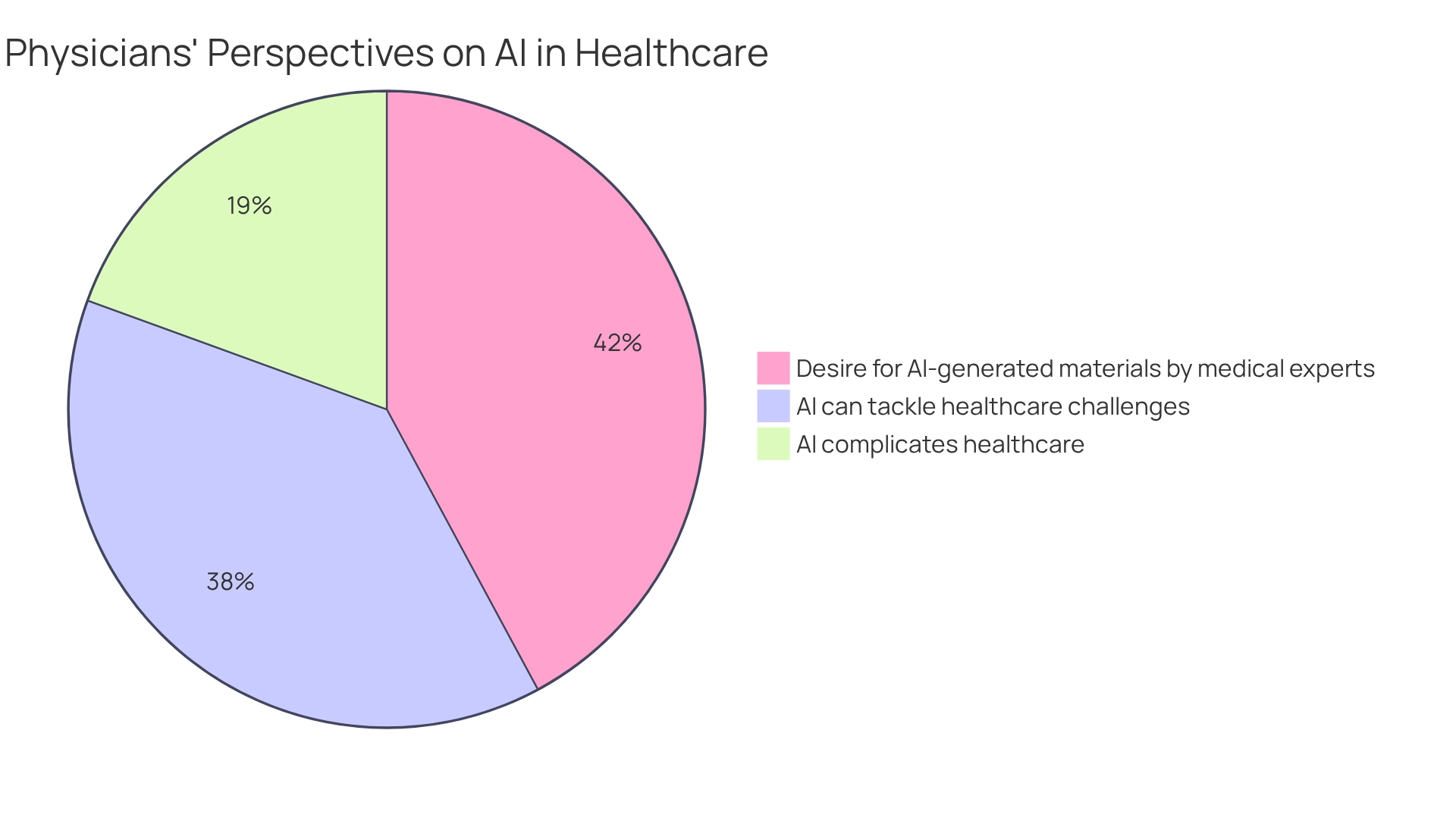
PMC: Discover AI Tools for Improved Mental Health Documentation
CosmaNeura provides valuable insights into various AI tools, such as ai mental health notes, aimed at improving mental health documentation and enabling professionals to streamline their practices effectively. These innovative solutions not only enhance efficiency but also elevate the quality of patient support, addressing the significant resistance to innovation often encountered in the healthcare industry, particularly for startups.
Healthcare startups frequently face challenges in technology sales discussions, as many doctors tend to be risk-averse, concerned about maintaining their standard of service. This resistance can impede the adoption of innovative solutions. Traditional accelerators often lack the specialized support necessary for healthcare startups, leaving them ill-prepared to navigate these obstacles.
Recent research indicates that the stigma surrounding mental well-being can pose substantial barriers to support, underscoring the need for effective record-keeping systems that foster trust and accessibility. By leveraging AI mental health notes, professionals can ensure meticulous record-keeping while prioritizing their interactions with individuals, ultimately aiding in overcoming stigma and improving access to care.
A noteworthy case study titled 'Shared Responsibilities in AI Mental Health Practice' emphasizes the importance of collaboration between clinicians and clients. It highlights the necessity for counselors to select ethical AI tools, educate themselves on the technology's limitations, and maintain accurate records, regardless of AI assistance. This collaborative approach not only nurtures trust and establishes healthy boundaries but also empowers clients to understand and advocate for their data rights, addressing the challenges startups face in gaining acceptance within the healthcare community.
Current trends in AI solutions reveal a growing focus on ai mental health notes that enhance documentation efficiency. For example, AI-driven platforms can create ai mental health notes by automating note-taking during sessions, allowing clinicians to concentrate on patient engagement rather than administrative tasks. This shift not only saves time but also enhances job satisfaction among providers, as they can devote more energy to compassionate care.
Moreover, statistics show that AI tools can significantly improve record-keeping efficiency, with some solutions claiming up to a 30% reduction in time spent on administrative tasks. As explore these AI resources, they can identify the tools that best align with their practice needs, ultimately leading to better outcomes for both providers and patients.
Integrating AI mental health notes into record-keeping methods is not merely about efficiency; it’s about transforming the therapeutic experience. As Frederick Douglass stated, 'struggle is necessary for progress.' By embracing these advancements, healthcare providers can ensure that their documentation processes are not only effective but also ethically sound, reflecting the compassionate spirit of support.
In this journey of improvement, as Nido Qubein wisely noted, "Your present circumstances don’t determine where you go; they merely determine where you start." By adopting AI mental health notes, mental wellness experts can pave the way for a more efficient and compassionate future in patient care.
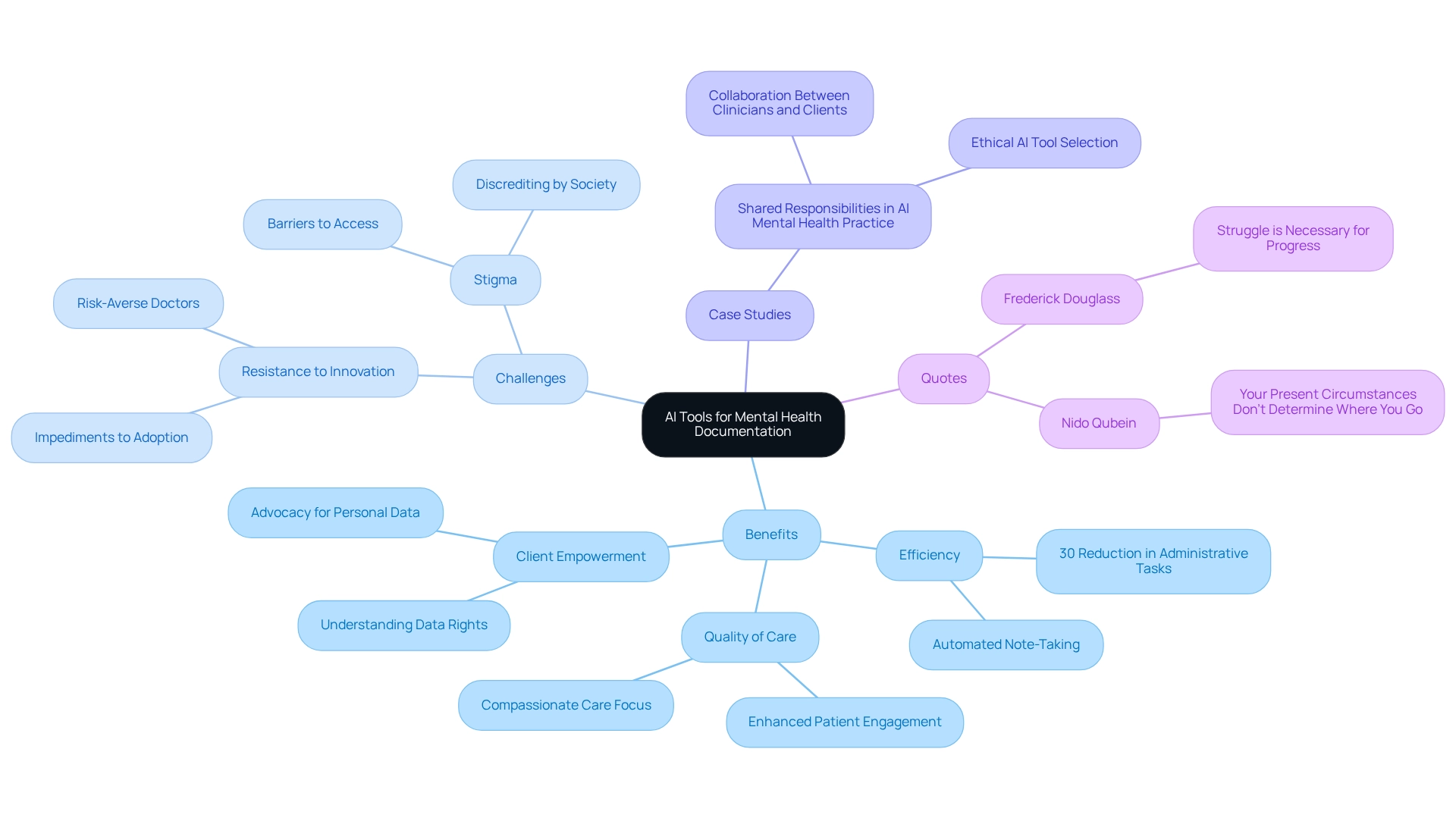
Heyberries.com: Generate Personalized Notes for Mental Health Sessions
Heyberries.com offers a compassionate solution for mental health professionals seeking to enhance their practice. Are you feeling overwhelmed by the administrative burdens that can distract from your therapeutic relationships? This innovative platform provides personalized notes tailored to the unique needs of your clients, allowing you to document sessions efficiently. By simplifying , Heyberries.com fosters a deeper connection between therapists and patients, enabling you to focus on what truly matters: the healing journey.
Imagine being able to streamline essential tasks like appointment scheduling and medical record management. This not only saves you valuable time but also enhances the quality of service you provide. Research shows that personalized notes can significantly improve therapy effectiveness, with clients reporting a reduction in anxiety levels from 8/10 to 5/10 during role-playing sessions. This improvement stems from the clarity and relevance of the tailored materials, which empower you to meet specific client needs more effectively.
Furthermore, progress notes serve dual purposes as clinical and legal documents, highlighting the importance of accuracy and adherence to ethical standards. Are you ready to elevate your practice? The ability to quickly generate well-structured notes facilitates better communication among healthcare providers, ensuring continuity of care and ultimately benefiting the therapeutic process.
Consider employing formats like SOAP and DAP in your progress notes. These effective record-keeping practices reinforce the advantages of personalized notes, allowing you to navigate the complexities of client care with confidence. Let Heyberries.com be your partner in creating a nurturing environment for your clients, where their needs are met with compassion and expertise.
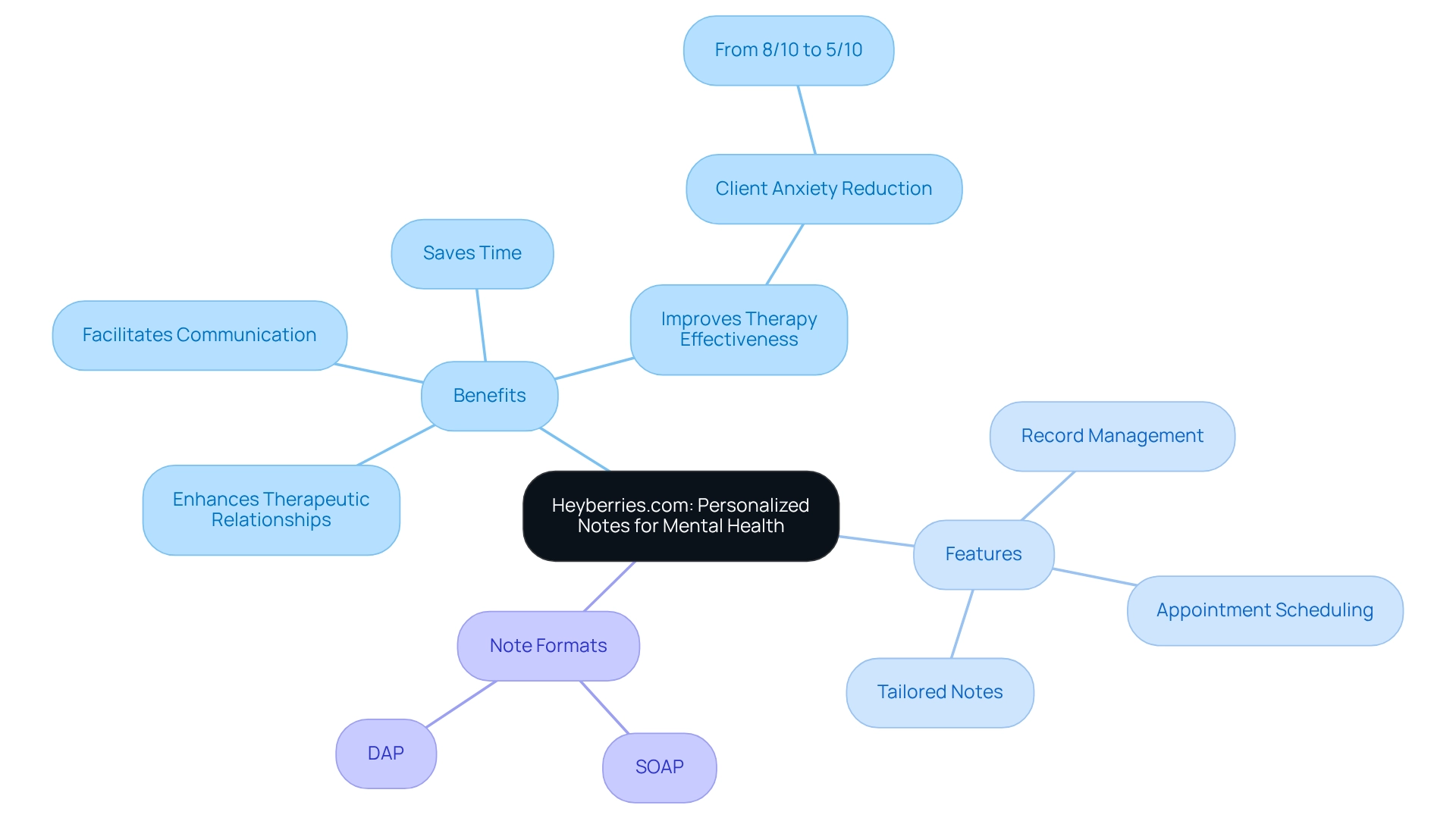
Counseling.org: Recommendations for Integrating AI into Mental Health Documentation
Counseling.org provides vital recommendations for integrating AI mental health notes into documentation practices, emphasizing the importance of ethical considerations and practical steps for successful adoption. These guidelines aim to support practitioners in maintaining a patient-centered approach while effectively leveraging AI technology, especially in a healthcare environment that often resists innovation, including the use of AI mental health notes. Consider the following key recommendations:
- Prioritize Care for Individuals: It’s essential that AI tools enhance, rather than replace, the human element in interactions with individuals. This approach fosters trust and preserves the therapeutic relationship, which is crucial in a field where many providers feel hesitant about embracing new technologies like AI mental health notes. Additionally, ethical oversight requires that for AI use must be established, focusing on confidentiality, informed consent, and the responsible handling of sensitive data. This is especially important as 29.9% of young adults use virtual assistants weekly, highlighting the growing reliance on technology in healthcare and the need for robust ethical oversight in AI applications.
- Training and Education: Comprehensive training for practitioners on AI tools is vital to maximize benefits while minimizing risks. This includes recognizing the limitations of AI mental health notes in mental wellness contexts, particularly in a domain where practitioners may be reluctant to adopt change.
- Continuous Evaluation: Regular assessments of the effectiveness of AI mental health notes in enhancing documentation accuracy and efficiency are necessary. This can help identify areas for improvement and ensure that technology adheres to ethical guidelines, addressing the concerns of those cautious about innovation. Engaging mental wellness experts in the creation and execution of AI systems, particularly for AI mental health notes, is crucial to ensure that the tools meet the specific needs of practitioners and patients alike. For instance, platforms like CosmaNeura exemplify this recommendation by actively involving healthcare providers in the design of their AI solutions, ensuring they enhance clinical workflows and address the unique challenges faced by startups in the healthcare sector, particularly in managing AI mental health notes.
By following these guidelines, mental health providers can navigate the complexities of AI integration while upholding ethical standards and improving the quality of care. Case studies show that platforms like CosmaNeura are at the forefront of this transformative approach, significantly enhancing job satisfaction and promoting revenue growth through optimized billing practices. As AI continues to evolve, staying informed about advancements is essential for maintaining a competitive edge in the healthcare landscape.
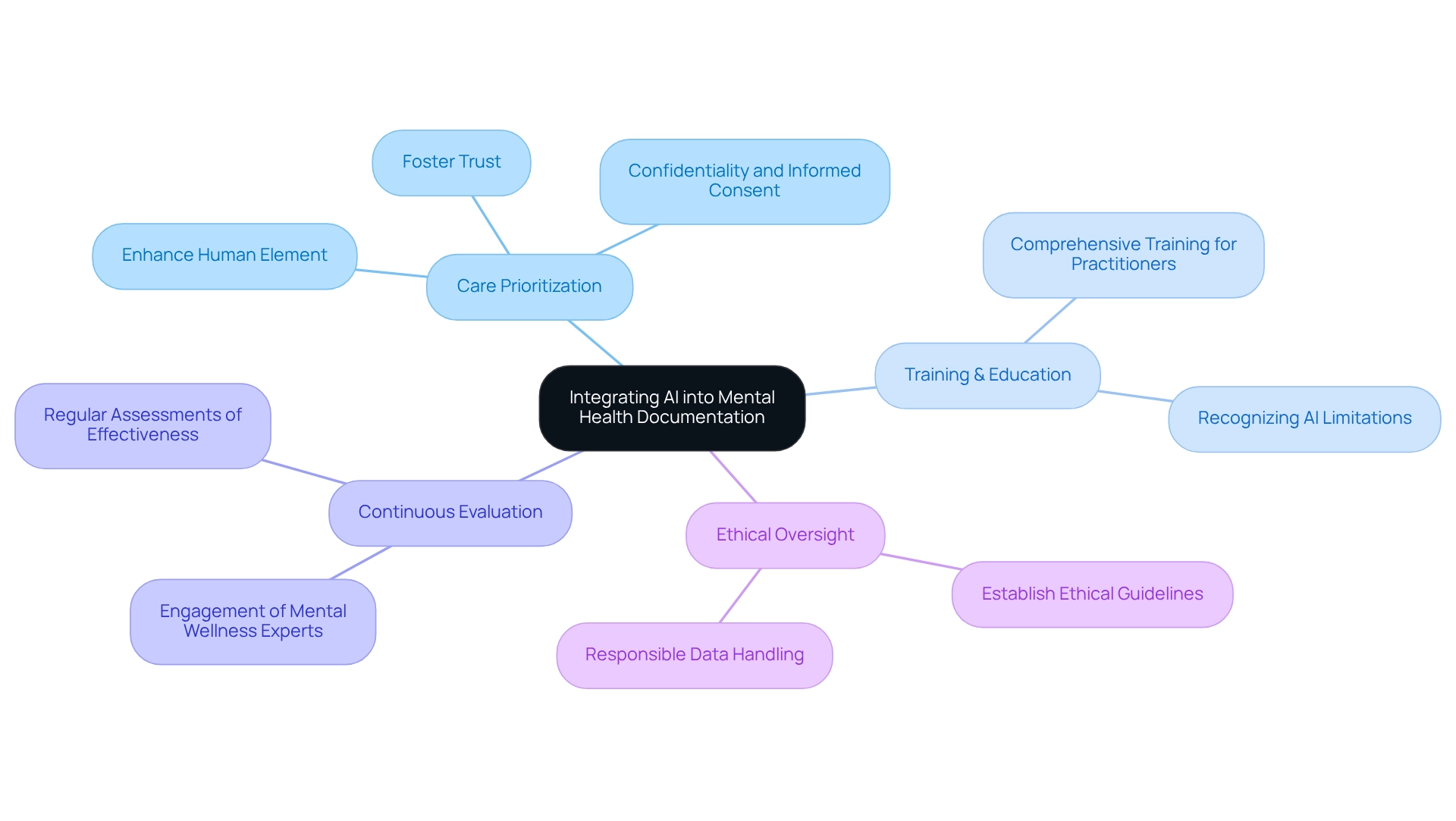
Conclusion
The integration of artificial intelligence in mental health care is truly transforming how practitioners manage documentation and patient interactions. Tools like CosmaNeura and Therapulse.ai alleviate the administrative burdens that often overwhelm providers. This shift allows them to focus more on compassionate care and meaningful connections with their patients.
AI not only enhances efficiency but also improves compliance with industry standards and patient outcomes. Clinicians have reported significant time savings and increased job satisfaction, highlighting the potential for AI to redefine therapeutic relationships. Yet, we must approach this integration with care; ethical considerations and the human element of therapy must remain a priority.
To successfully integrate AI into mental health care, practitioners should:
- Ensure data security
- Provide adequate training
- Adopt patient-centered practices
By addressing these challenges, mental health professionals can truly leverage technology to enhance their practice and deliver high-quality care.
In conclusion, the future of mental health documentation lies in effective AI integration. By embracing innovation while maintaining ethical standards, providers can improve both efficiency and patient care. This transformation transcends technology; it’s about creating a more compassionate healthcare system that meets the needs of both clinicians and clients. The journey toward this improved future is already underway, with AI poised to play a pivotal role in the evolution of mental health care.




